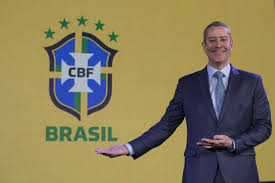By Samindra Kunti
April 10 – Rogerio Caboclo has been inaugurated as the new president of the Brazilian Football Confederation (CBF). The finance lawyer and protege of former CBF president Marco Polo Del Nero has a four-year term to shake off the governing body’s tainted image and end Brazil’s international isolation.
In April 2018 Caboclo was elected unopposed for the biggest job in the Brazilian game. He ran for the presidency with the backing of Del Nero, under the election slogan “transparency and efficiency”. The 46-year-old will succeed Coronel Nunes, who had largely been alienated from the game towards the end of his interim reign.
Caboclo, a Paulista, has a mandate until 2023 and in order to build a creditable presidency he will need to clean up the CBF, an organisation tainted by corruption. Former CBF presidents Ricardo Teixeira, Jose Maria Marin and Del Nero have all been discredited and investigated in the FIFAgate scandal. Marin is currently serving jail time in the United States.
“I am aware of CBF’s worn out image, I will face this. We will increase our governance controls. I will not tolerate any suspicious practice of misconduct,” said Caboclo in his inauguration speech.
But that may perhaps be taken with a pinch of salt. After all, it was Del Nero who ensured that Caboclo could run unopposed for the top job in the Brazilian game. Caboclo also invited more than 30 Brazilian football executives to the Russia World Cup on the CBF budget to garner support for his presidency.
The new CBF president has ample experience in football and the game’s local politics. He started as a finance director at Sao Paulo, one of Brazil’s biggest clubs, moved to the Sao Paulo Football Federation, then presided over by Del Nero, to take up the same role before working for the local organizing committee for the World Cup in 2014 as link between FIFA and the CBF. In 2018, he led the Brazilian delegation at the World Cup in Russia, where the five-time world champions crashed out in the last eight against Belgium.
The Brazilian public will demand that the national team be more competitive at the 2022 World Cup in Qatar, but Caboclo’s immediate challenges will be closer to home. He will lead the organising committee for the 2019 Copa America on home soil, which is set to be played from June 14 to July 7.
Brazilian football will also look at him for other reforms and he has introduced a raft of minor measures to begin his presidency. Former Arsenal and Barcelona defender Sylvinho was appointed Brazil’s coach for the Tokyo Olympic Games next year. The CBF will launch a council of former players, including Cafu, Ricardo Rocha, Jairzinho, Careca, Carlos Alberto Parreira, Zinho, Gilberto Silva and Juninho Paulista, as an advisory body. The former Middlesborough midfielder will also take up the role of director of football development.
Caboclo also promised a new training complex. Currently, Brazil have their national training centre in the mountains north of Rio de Janeiro in Teresopolis, but the new CBF president wants another complex in Barra Da Tujica in Rio De Janeiro, a stone’s throw from the CBF headquarters. He also confirmed that former referee Leonardo Gaciba will head the referees committee as Brazil introduces VAR in its domestic top flight this year.
None of these measures will however free Caboclo from reforming Brazilian football, with its out-of-sync calendar and outdated state championships, and from cleaning up the CBF as organisation with a real commitment to good governance in practice.
His every move will also be watched with great scrutiny abroad. FIFA president Gianni Infantino was present at Caboclo’s inauguration together with Conmebol chief Alejandro Dominguez. The FIFA boss last visited Brazil in 2016 during the Olympic Games when Marco Polo Del Nero was still in command of the CBF, but Infantino is in Rio de Janeiro to attend the 70th Conmebol congress where he is expected to promote his 48-team World Cup expansion once more. “To improve [Brazil’s] image he [Caboclo] needs to show serious work and develop soccer,” said Infantino.
“It is time to modernize football and Rogerio is a partner in that direction,” said Dominguez. In his inauguration speech Caboclo had gone on the charm offensive, effusively praising both Infantino and Dominguez. In spite of hosting the 2014 World Cup, Brazil has endured almost a pariah status in international football politics. From 2015 to 2018 Marco Polo Del Nero refused to travel abroad, because he feared arrest in the FIFAgate scandal. The world governing body also halted the transfer of $100 million from the World Cup legacy fund to Brazil over fears of potential misappropriation of the money.
Coronel Nunes infuriated the rest of South America when he voted for Morocco during the host elections for the 2026 World Cup. The Brazilian later claimed that he had done so, believing that it was a secret vote. The rest of South America wanted Nunes’s head on the block, but Caboclo and Fernando Sarney, Brazil’s representative in Zurich, appeased the situation as Nunes was maintained on the Conmebol council, but not allowed to actually participate. Caboclo will now have to smooth over the cracks in Brazil’s relationship with the rest of the continent and re-establish a closer relationship with FIFA.
Contact the writer of this story, Samindra Kunti, at moc.l1745812072labto1745812072ofdlr1745812072owedi1745812072sni@o1745812072fni1745812072

